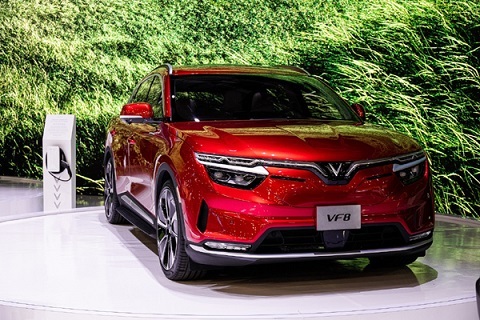
VF e34 electric cars have been delivered by VinFast to clients who placed orders.
As a C-class SUV, the cars are equipped with 110 kW (147 horsepower) electric engine, which is equal to 2.0 L petrol engine. Using a battery pack with a capacity of 42 kWh, when fully charged, it can run 285 kilometers. It is associated with super fast charging, with 18-minute charging allowing to run a distance of 180 kilometers.
According to the manufacturer, more than 25,000 clients have ordered this model, and it plans to deliver 2,000 cars each month to sale agent from early 2022.
Announcing the development of electric cars in March 2021, VinFast launched the first model in December of the same year.
Also in December 2021, Vingroup kicked off the construction of a battery production plant, VinES, in Vung Ang Economic Zone (EZ) in Ha Tinh with the total investment capital of VND4 trillion in the first phase. The plant will manufacture batteries for the car manufacturer. It plans to put out 100,000 battery packs a year.
The moves are important steps to implement a plan on developing electric vehicles in Vietnam. Vietnam hopes it will become an electric vehicle manufacturing center in the future.
VAMI (Viet Nam Association of Mechanical Industry) recently made a proposal on clean-fuel vehicle development to the Prime Minister. The association believes that electric vehicle (EV) manufacturing will help increase the localization ratio and attract investors to invest in battery production.
This would bring a lot of benefits. First, Vietnam can develop a clean-fuel automobile industry in line with the global trend. Second, this creates a clean means of transport, reducing pollution. Third, Vietnamese manufacturers can export products.
| Vietnam’s electric automobile industry has started and many enterprises want to join the automobile production chain as they can see great opportunities. |
The document affirmed that mechanical engineering manufacturers, the members of VAMI, want to join the EV manufacturing chain in Vietnam as they can see great potential for development.
VAMI has proposed setting specific goals for the development of the EV industry in Vietnam: all cars to be registered from 2035 would be ones using clean fuel, the same goal as Thailand’s; and from that year, Vietnam would only manufacture pure electric vehicles.
Preferences for EV manufacturing
A number of proposals on the development of EV manufacturing industry in Vietnam were made in 2021.
Vingroup proposed that the Government apply preferential luxury and vehicle registration taxes for five years. The Vietnam Automobile Manufacturers’ Association (VAMA) also proposed preferential taxes for EVs in 2021-2030 and support to EV buyers and to EV manufacturers. Meanwhile, VAMI proposed a special preferential mechanism like the one applied in Thailand and regional countries.
The Ministry of Finance (MOF), after collecting opinions from relevant ministries and branches, has proposed the exemption of registration tax for three years and 50 percent reduction for the next two years.
The Government has submitted to the National Assembly a plan on reducing the luxury tax on EVs by 5-12 percentage points from the current 15 percent, for the first five years
Thailand has announced a plan to become an EV manufacturing center of ASEAN, planning to put out 750,000 products a year by 2030. Indonesia is on its way to become an EV manufacturing center in the region. Thanks to attractive policies, automobile manufacturers are flocking to Indonesia.
In general, there are three major policies to encourage EV development, including preferences for manufacturers; subsidies for EV buyers; and support for infrastructure development and administrative procedures.
“Vietnam should not be slow in the EV game,” Nguyen Minh Dong, a respected automobile expert, said, adding that many countries have drawn up strategies on EV development, offering big preferences.
In China, EV manufacturers can receive 30 percent capital subsidy to build charging stations and subsidy of $8,000 for every car manufactured. Chinese people can enjoy 50-100 percent reduction in registration fee. Meanwhile, the Canadian Government gives 7,000 CAD to each EV buyer.
According to Dong, in addition to tax cuts, the Government should encourage the development of infrastructure items for EVs, including charging stations, and support those who buy EV.
According to manufacturers, EVs are 45 percent more expensive than petrol-run cars because of high battery manufacturing costs. However, with the rapid development of technology, batteries are getting better and cheaper.
Analysts predict that EV prices will decrease gradually and will be just 10 percent higher than petrol-run cars by 2030. If the policies on encouraging the use of EV are designed well, EVs would be popular after 2030. Shifting to EV is described as a ‘once in every 100 years’ opportunity.
Tran Quang Ha, Deputy Director of the Science and Technology Department under the Ministry of Transport (MOT), said the standards for EV batteries would be built in 2022. The ministry will also make proposals on tax and fee policies to encourage EV development.
Tran Thuy

First US firm orders 100 VinFast electric cars at CES 2022
Artemis DNA has become the first US firm to place an order to purchase 100 electric cars of VinFast following the Vietnamese automaker’s new model debut at the technology exhibition CES 2022 in Las Vegas (USA).

Once-in-a-lifetime opportunity to rewrite development scenario for VN auto industry
Developing electric vehicles is a "golden opportunity" that comes once every hundred years and a chance for Vietnam to rewrite the development scenario for the auto industry.
